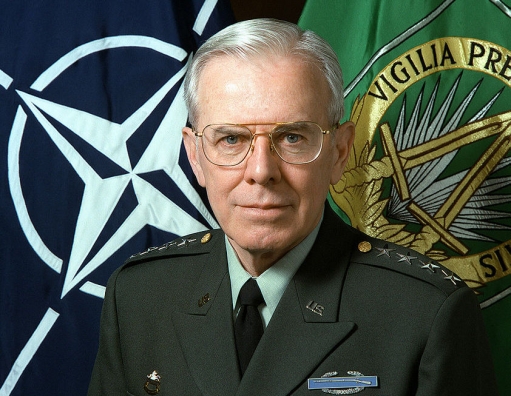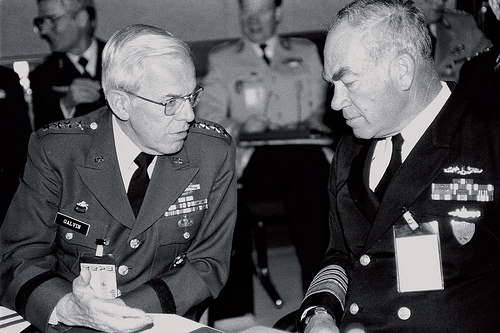 From Harrison Smith, Washington Post: John R. Galvin, a four-star Army general who served as the United States’ and NATO’s top military commander in Europe in the final years of the Cold War and whose foresight on counterinsurgency strategy influenced one of his young aides, future general and CIA director David H. Petraeus, died Sept. 25 at his home in Jonesboro, Ga. He was 86….
From Harrison Smith, Washington Post: John R. Galvin, a four-star Army general who served as the United States’ and NATO’s top military commander in Europe in the final years of the Cold War and whose foresight on counterinsurgency strategy influenced one of his young aides, future general and CIA director David H. Petraeus, died Sept. 25 at his home in Jonesboro, Ga. He was 86….
In a 44-year military career, Gen. Galvin was widely described as a prototypical warrior-intellectual. He was a West Point graduate who also earned a master’s degree in English literature from Columbia University and reveled in the poetry of William Butler Yeats….
Thinking beyond large-scale, conventional warfare with the Soviet Union and other nation-states, he wrote influential reports and articles on counterinsurgency strategy and guerrilla warfare that would define conflicts in the Middle East after the 2003 U.S. invasion of Iraq.
Petraeus, as commander of coalition troops in Iraq, in part applied the general’s counterinsurgency tactic of coordinating military force with political and economic measures.
The two men met in the early 1980s, when then-Capt. Petraeus served as an aide-de-camp to Gen. Galvin….
In 1987, as the newly appointed supreme allied commander in Europe, a NATO position, he publicly endorsed the Intermediate-Range Nuclear Forces Treaty signed by President Ronald Reagan and Soviet leader Mikhail Gorbachev. The accord eliminated an entire category of nuclear weapons both nations had deployed in Europe, facing each other.
“Maybe we can’t strike as many targets as before, but neither can the Soviets,” he said, adding that he was still confident he could carry out his mission of Soviet deterrence and defense of western European allies. (In 2007, however, Russian President Vladimir Putin essentially said the treaty was no longer in Russia’s interest, and last year the U.S. charged that Moscow had breached the treaty by testing a missile whose range was prohibited by the treaty).
Gen. Galvin remained as supreme commander in Europe until retiring in 1992. As the Soviet Union collapsed, he pivoted NATO strategy from one of Cold War defense to small-conflict peacekeeping, arguing for a “fire brigade” strategy in which troops were available in case conflict arose.
The strategy anticipated ethnic conflict in the breakup of Yugoslavia, where NATO forces were used in the late 1990s, although many in Congress called for a complete U.S. military withdrawal from Europe after the close of the Cold War.
The son of a bricklayer and plasterer, John Rogers Galvin was born in Melrose, Mass., on May 13, 1929, and grew up in Wakefield, Mass….
He graduated [from the U.S. Military Academy at West Point, N.Y] in 1954, becoming the first member of his family to obtain a college degree. He liked to recall that his time at West Point was distinguished mainly by his cartooning abilities, frequent infractions and participation in the theft of the Naval Academy’s goat mascot.
He later trained as a parachutist and graduated from Ranger School. In 1962, he received a master’s degree in English at Columbia and worked toward a doctorate in English at the University of Pennsylvania. His books included two volumes of Revolutionary War history and a memoir, “Fighting the Cold War,” published earlier this year.
Gen. Galvin served as dean of the Fletcher School of Law and Diplomacy at Tufts University in Medford, Mass., from 1995 to 2000. He then moved to Jonesboro.

June 7, 1989, (photo: NATO).
From Sam Roberts, New York Times: General Galvin oversaw the North Atlantic military alliance for five years, from 1987 to 1992, retooling it into a more mobile, flexible multinational force after the collapse of the Soviet Union and the resulting deep reductions in NATO’s conventional and nuclear arms.
With his forces no longer facing the German-Polish border, General Galvin won the confidence of former Soviet satellite nations in Eastern Europe as they sought to join the alliance.
When General Galvin retired in 1993, Barton Gellman, a Pulitzer Prize-winning reporter for The Washington Post, described him as “arguably without peer among living generals” and “a man who anticipated and helped shape a new era.”
“He is leaving as a consummate diplomat,” Mr. Gellman wrote in The Post, “who more than any other Westerner gave Moscow’s generals the confidence to let their war machine unravel.”
General Galvin was awarded the Distinguished Service Medal, the Silver Star, the Legion of Merit and the Distinguished Flying Cross. He was also inducted into the United States Army Ranger Hall of Fame.
Image: Gen. John Galvin, NATO SACEUR and EUCOM Commander1987-1992 (photo: Department of Defense)
